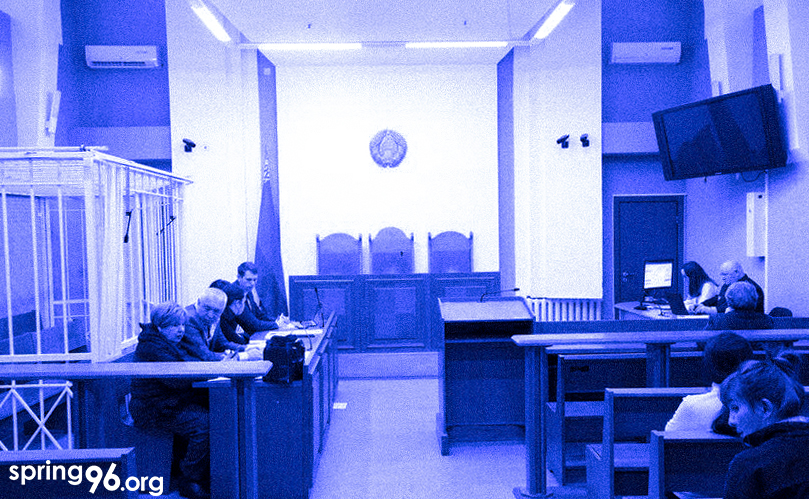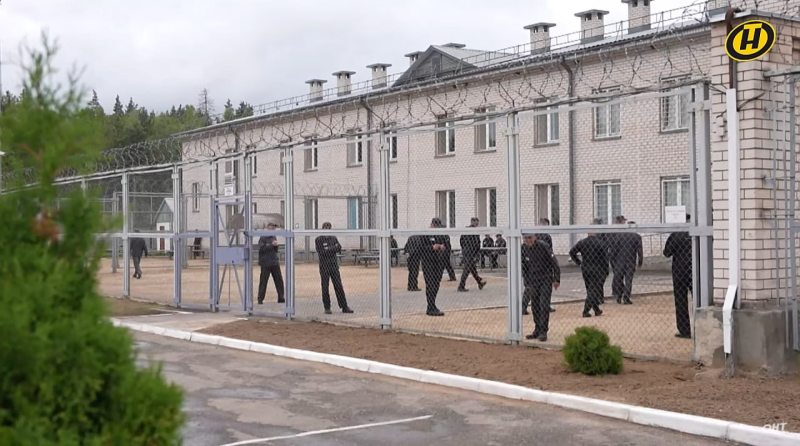In July, at least 170 people were convicted in political criminal cases
During July, Viasna human rights defenders noted a significant increase in criminal prosecution for political reasons. This was due to group trials against participants in the 2020 protests in Brest and Hrodna regions. According to preliminary data, 170 people were convicted in July, of which 36 were women and 134 were men. Viasna traditionally reports the specifics of the criminal prosecution last month.
78 political criminal trials have been held in Minsk in a month
The prosecution in politically motivated criminal cases in different regions in July looked as follows:
- Minsk — 78 people;
- Brest region — 35 people;
- Hrodna region — 21 people;
- Homieĺ region — 16 people;
- Minsk region — 5 people;
- Mahilioŭ region — 12 people;
- Viciebsk region — 3 people.
At least 28 people were convicted in absentia
It should be noted that there was an increase in special proceedings: at least 28 people were convicted in absentia in July alone. In early July, the Minsk Regional Court handed down guilty verdicts against 20 public figures who "belonged" to the extremist formation of the Sviatlana Tsikhanouskaya Analysts. In the result, Aliaksandr Dabravolski, Ryhor Astapenia, Filip Bikanau, Yury Drakakhrust, Andrei Kazakevich, Hanna Krasulina, Yauhen Kryzhanouski, Dzianis Kuchynski, Veranika Laputska, Aliaksandr Lahvinets, Hanna Liubakova, Vasil Navumau, Maryia Rohava, Piotr Rudkouski, Alesia Rudnik, Natallia Rabava, Pavel Usau, Tatsiana Chulitskaya, Aliaksandr Shlyk, and Katsiaryna Shmatsina were sentenced to terms from ten to eleven and a half years of imprisonment with fines ranging from 40,000 to 1,600,000 roubles (11,400 to 456,000 euros).
Another group of political emigrants was convicted in absentia, which the authorities united into an extremist formation Forum of Democratic Forces of Belarus. The Brest Regional Court sentenced Yauhen Vilski, Veranika Tsapkala, Vadzim Dzmitronak, Volha Karach, and Anatol Kotau to 12 years of imprisonment each and fines ranging from 40,000 to 600,000 roubles (from 11,000 to almost 170,000 euros).
Sentences in absentia were handed down against Volha Vialichka, Andrei Zuyeu, and Yury Shchuchko. A preliminary analysis allows us to conclude that the Belarusian authorities thus deprive of any political basis any public initiative that could have an impact on public opinion within the country, immediately before the change of electoral cycles associated with the presidential elections in 2025.

Special proceedings in Belarus explained
59% of the charges included Article 342 of the Criminal Code
The criminal prosecution for political reasons in July was still determined by continuous repression associated with the detentions of participants in spontaneous protests held in August–September 2020. Of the 170 people who were most likely convicted last month, 59% of the them received charges containing Article 342 of the Criminal Code, which stipulates responsibility for organizing or participating in group actions that grossly violate public order.
In July, human rights activists recorded a case of persecution under Article 342 of Dzina Racheuskaya in the Frunzensky District Court of Minsk as a person who committed a socially dangerous act. This suggests that compulsory security and medical measures could have been applied against the woman for exercising her right to peaceful assembly and expression of opinion.
Persecution of families
Article 342 of the Criminal Code is used to persecute entire families or groups of relatives. The case against Kanstantsin and Veranika Kavaleuski was heard in the Tsentraĺny District Court of Minsk. Two days before their trial, the Tsentraĺny District Court of Minsk heard the case of Kanstantsin's brother, Artsemii Chop. The case of Liudmila and Pavel Tsarou was heard in the same court. The case against Siarhei Tarasik and Darya Davydzenka-Tarasik was heard in the Maskoŭski District Court of Minsk. The case against Alena and Katsiaryna Liankevich was heard in the Partyzanski District Court of Minsk.
New persecution of political prisoners
Criminal prosecution for political reasons is intensively used by the authorities to re-convict and subsequently convict citizens, which creates the effect of "prolonged and continuous repressive influence." In July, Dzmitry Zahalavets was convicted again; his case was considered by the Viciebsk Regional Court under the article on financing extremist activities. Earlier, the political prisoner was sentenced by the same court to three and a half years of imprisonment under articles on insulting Aliaksandr Lukashenka (Part 1 of Article 368 of the Criminal Code), insulting a government representative (Article 369), facilitating extremist activities (Part 1 of Article 361-1 of the Criminal Code), and financing the activities of an extremist formation (Article 361-2 of the Criminal Code).
Andrei Kudzik, an activist from Viliejka, was sentenced by the Maladzečna District Court to four years of imprisonment under the article on discrediting the Republic of Belarus. In February 2022, the Zavadskoj District Court of Minsk sentenced him to two years of imprisonment under Article 342, which he served in full and was released.
A number of criminal cases under Articles 342 and 411 of the Criminal Code are used against the iconic figure of the protest movement Zmitser Dashkevich. In July 2022, the Maskoŭski District Court of Minsk sentenced the defender of Kurapaty to 1.5 years of imprisonment under Article 342. In October 2023, the activist's sentence was extended by one year, with the help of Article 411 of the Criminal Code, which allows for infinite extensions. In July, a new trial began on the political prisoner under Article 342 in the Peršamajski District Court in Minsk.
Additional pressure is applied against political prisoners within the penitentiary system, since criminal prosecution is systematically used against them under Article 411 of the Criminal Code, which stipulates punishment for "malicious disobedience to the requirements of the administration of a correctional institution executing a custodial sentence." In July, four out of five political prisoners were charged under this article (its second part), which stipulates the possibility of extending the term of imprisonment for up to two years (under to the first part, the term can be extended up to a year).
The Žodzina City Court held a trial of political prisoner Mikita Zalatarou under Part 2 of Article 411 of the Criminal Code, and the results are not yet known. The young man is serving a sentence of four and a half years of imprisonment under articles on mass riots, threat of violence against an employee of the internal affairs bodies, and illegal actions in relation to firearms, ammunition, and explosives. Ruslan Volkau, who is serving four years for participating in protests on the central street of Brest on August 9–10, 2020, was prosecuted under Part 2 of Article 411 of the Criminal Code in the Navapolack City Court. As in the case of Mikita Zalatarou, the details of the trial are unknown to human rights defenders at the time of publication of the article.
The Barysaŭ District Court added one year of imprisonment to the sentence of political prisoner Siarhei Dziatsuk under Part 1 of Article 411 of the Criminal Code. The man was sentenced to three years of imprisonment under the article on threat or violence against an employee of the internal affairs bodies. Two years of imprisonment, in addition to the eight sentenced, was added a year ago by the Babrujsk District Court to Eduard Babaryka under Part 2 of Article 411 of the Criminal Code. The Leninski District Court of Mahilioŭ sentenced Tsimur Ryzapur to one year of imprisonment under Part 2 of Article 411 of the Criminal Code; the man had been serving a sentence of four and a half years of imprisonment under the article on mass riots in Brest in August 2020.
The trials of journalists
Criminal prosecution for political reasons affects representatives of civil society on a monthly basis. In July, the Mahilioŭ Regional Court convicted journalists Ales Sabaleuski and Yauhen Hlushkou.
Aliaksandr Sabaleuski was sentenced to four years of imprisonment with a fine of 8,000 roubles (more than 2,200 euros), and Yauhen Hlushkou was sentenced to three years of imprisonment with a fine of 8,000 roubles. Blogger Sabaleuski, along with videographer Hlushkou, were accused of creating (participating in) an extremist formation, as well as participating (or preparing to participate), as Belarusian citizens, in military operations on the territory of a foreign state without the authorization of the state.

More than half of those convicted in June in political criminal cases were punished for participating in 2020 protests
According to preliminary data, at least 146 people were convicted in June.

















